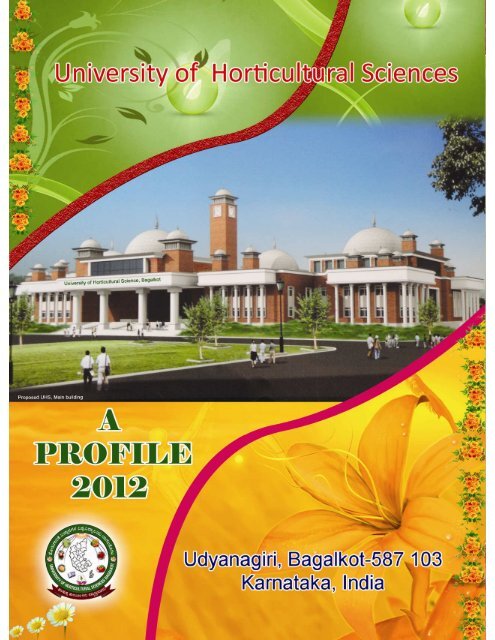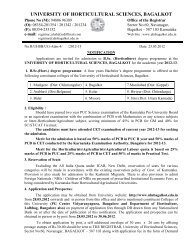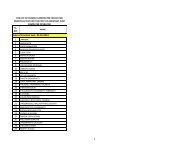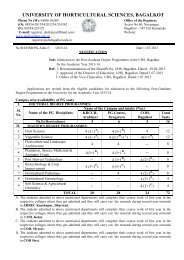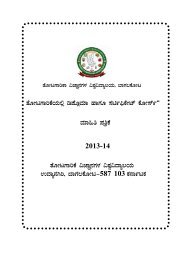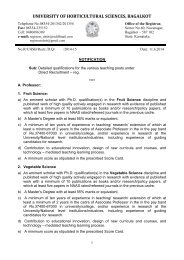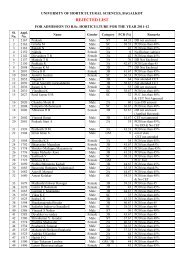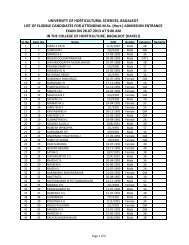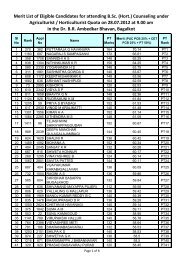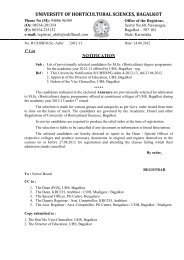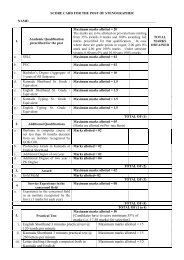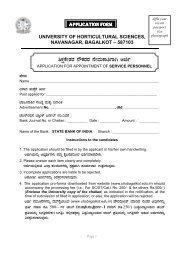University Profile 2012 - University of Horticultural Sciences, Bagalkot
University Profile 2012 - University of Horticultural Sciences, Bagalkot
University Profile 2012 - University of Horticultural Sciences, Bagalkot
- No tags were found...
You also want an ePaper? Increase the reach of your titles
YUMPU automatically turns print PDFs into web optimized ePapers that Google loves.
Preamble :Brief <strong>Pr<strong>of</strong>ile</strong> <strong>of</strong><strong>University</strong> <strong>of</strong> <strong>Horticultural</strong> <strong>Sciences</strong>, <strong>Bagalkot</strong>, Karnataka, IndiaRealizing the importance <strong>of</strong> horticulture and the need for research and development support for its furtherexpansion, the <strong>University</strong> <strong>of</strong> <strong>Horticultural</strong> <strong>Sciences</strong>, <strong>Bagalkot</strong> was established by the Government <strong>of</strong> Karnatakathrough a Special Ordinance (No. 2 <strong>of</strong> 2008) on 22-11-2008 and duly enacted by Karnataka Act No 11 <strong>of</strong> 2010 Dated13-05-2010. <strong>Bagalkot</strong> was rightly chosen for its head quarters as the district is known for its rich horticulturalproduction base <strong>of</strong> grapes, pomegranate, banana, lime, sapota, ber, fig, various types <strong>of</strong> vegetables, beetle vine,coconut, spices and medicinal plants. The district is surrounded by Belgaum in the West, Dharwad and Koppal in theSouth, Bijapur in the North and Raichur in the East, which are also the hubs for the production <strong>of</strong> grape, mango,pomegranate, flowers and vegetables. The area possesses congenial climate for all kinds <strong>of</strong> horticulture cropsbesides its rich historical and cultural heritage making it an ideal place for the Horticulture <strong>University</strong>. The mightyAlmatti Reservoir as a backbone for both agricultural and horticultural activity is also located within the erstwhiledistrict <strong>of</strong> Bijapur.The Mission :To enhance the growth <strong>of</strong> horticulture sector by providing leadership in creative teaching, strategic researchand effective extension education services in horticulture and allied sciences through continuous innovation andresulting emerging paradigms, concepts and technology development by adopting an end to end approach, resolvinginter-sectoral issues, addressing problem areas and promoting inter disciplinary and multi-dimensional researchfor development.The Mandate :The <strong>University</strong> has three important mandates namely, imparting quality education; conducting applied,strategic and basic research in all branches <strong>of</strong> horticulture and allied disciplines and conducting and facilitatingtransfer <strong>of</strong> technologies to the benefit <strong>of</strong> farming community through effective extension education system andoutreach programmes.Jurisdiction :The <strong>University</strong> <strong>of</strong> <strong>Horticultural</strong> <strong>Sciences</strong> <strong>Bagalkot</strong> has the jurisdiction <strong>of</strong> entire state <strong>of</strong> Karnataka. Accordingly,its colleges, Research and Extension Institutions are spread over to all the districts <strong>of</strong> the state.Strengths :Karnataka, the fourth important horticultural state <strong>of</strong> the country possesses salubrious climate conducivefor the cultivation <strong>of</strong> several horticulture crops; presence <strong>of</strong> enterprising farming community; ample opportunitiesfor horticultural growth; vibrant state department <strong>of</strong> horticulture with statewide network <strong>of</strong> qualified extension
2staff; wide coverage <strong>of</strong> programs through national horticulture mission; well managed Flower Auction Centre andGarden Trusts; presence <strong>of</strong> supportive institutions like APEDA, KAPPEC, NHB for horticulture development; HOPCOMSamarket network to avoid intermediaries and to ensure fare price to the producers; crop based grower’s organizationswith supportive laws and Governmental encouragement etc are the strengths <strong>of</strong> state for horticulture development.This is further supported with the establishment <strong>of</strong> an exclusive <strong>University</strong> <strong>of</strong> <strong>Horticultural</strong> <strong>Sciences</strong> with constituentcolleges, research stations, horticultural extension units <strong>of</strong> the university spread across the state.1. EducationDevelopment <strong>of</strong> the horticultural expertise and skilled manpower is one <strong>of</strong> the important mandates <strong>of</strong> the<strong>University</strong> which aims at meeting the technically trained human resource for the horticulture industry <strong>of</strong> the stateas well as outside.Academic Programs :The academic programmes comprise <strong>of</strong> Certificate Courses, Diploma, Graduate, Post- Graduate Diploma,Post Graduate Degree and Doctoral Programmes in various branches <strong>of</strong> Horticulture and allied sciences. The academicprogrammes are characterized by their unique emphasis on extending educational opportunities to students byintroducing much needed dynamism in horticultural education. The academic programmes are further supportedby the latest concepts like e-learning; experiential learning; exposure visits; state and national study tours; speciallecture series; participation in seminars; councelling; coaching etc., which help students and faculty in acquiringspecialized skills in line with the ICAR Educational guidelines supported by state <strong>of</strong> art laboratories, smart classrooms,digital libraries etc.Admissions to academic programs:Admission process for the graduate programmes begins in the month <strong>of</strong> June / July <strong>of</strong> every academic yearwith an announcement in leading news papers and media and the regular classes commence in the month <strong>of</strong> July /August. The admission for post graduate programs begins in the month <strong>of</strong> July / August and the classes begin in themonth <strong>of</strong> August / September.Graduate programs at constituent colleges:The university conducts the graduate program in horticulture (B.Sc.Hort) at the following nine constituent colleges.Sl Year <strong>of</strong> Proposed PresentNo. Name <strong>of</strong> the College & Location Establishment Annual Intake Strengthfor the year <strong>2012</strong>-13 (2011-12)(including ICAR quota)1 College <strong>of</strong> Horticulture, Mudigere 1990-91 60 208Chikkamagalur district2 KRC College <strong>of</strong> Horticulture, Arabhavi, 1994-95 60 253Belgaum district3 College <strong>of</strong> Horticulture, Bidar 2007-08 60 1494 College <strong>of</strong> Horticulture, <strong>Bagalkot</strong> 2008-09 60 1745 College <strong>of</strong> Horticulture, Kolar 2009-10 60 1296 College <strong>of</strong> Horticulture, Sirsi 2010-11 40 697 College <strong>of</strong> Horticulture, Mysore 2010-11 40 728 College <strong>of</strong> Horticulture, Hiriyur, 2010-11 40 62Chitradurga district9 College <strong>of</strong> Horticulture, Munirabad, 2010-11 40 68Koppal districtTotal 460 1184<strong>University</strong> <strong>Pr<strong>of</strong>ile</strong> <strong>2012</strong>
3There is also provision for the admission <strong>of</strong> Foreign Nationals/Non Resident Indians/ Kashmiri migrants /Children <strong>of</strong> NRI irrespective <strong>of</strong> the place <strong>of</strong> previous education under the special quota. Foreign Nationals need toapply through the Secretary, Department <strong>of</strong> Agricultural Research and Education, Krishi Bhavan, New Delhi, 110001. The 15% <strong>of</strong> the seats will be admitted under ICAR quota. In addition, over and above this 12% <strong>of</strong> state seats areadmitted from special categories like defense, Anglo Indian, Ex-Service man, physically disabled, scouts and guides,NCC and sports.Post Graduate Programs :Post-Graduate Programmes are aimed at developing manpower for leadership in research and meeting theneeds <strong>of</strong> managerial pr<strong>of</strong>essionals in horticulture and allied sectors. The courses are designed to keep pace withthe developments in science and technology across the world and to meet the demands for experts in critical areas<strong>of</strong> horticulture and allied sciences. Exposure to emerging areas, hands-on experience in modern techniques andapprenticeship in horticulture R & D centers ensure quality education in the post-graduate programme. Notsurprisingly, the PG programme has been successful in attracting students from many Asian and African countries.The <strong>University</strong> currently <strong>of</strong>fers Master’s Degree programmes in nine disciplines (Vegetable Science; Fruit Science;Post Harvest Technology; Floriculture and Landscape Architecture; Plantation Spices Medicinal and Aromatic Plants;Crop Improvement & Bio-technology; <strong>Horticultural</strong> Entomology, Horticulture Pathology, Soil Science and AgricultureChemistry at its various Campuses. Doctoral Degree programme is imparted at Arabhavi and Bangalore campus.Presently 168 M.Sc. students and 32 Ph.D students are enrolled in all the four campuses.
4Diploma and certificate courses :The <strong>University</strong> is starting “Certificate Courses in Horticulture” (6 months duration) and “Diploma inHorticulture” (2 years duration), at different constituent colleges and research stations along with PG diploma inViticulture and Enology in the academic year <strong>2012</strong>-13.Facilities and Activities at different teaching campuses :<strong>University</strong> provides hostel accommodation to both boys and girls in all its college campuses. Facilities likemulti-gym, play ground, healthcare, recreation, cafeteria, internet etc., are made available in all its campuses.Students study circles have been started in different campuses which organize college level workshops, mockinterviews, guest lectures, quizes, group discussions, debates, etc., so as to help the students to get ready forregular seminars, campus interviews and competitive examinations. Establishment <strong>of</strong> placement cells is beingplanned at all its campuses to assist the students for finding better employment opportunities both in public andprivate sector organizations. The <strong>University</strong> and local philanthropists have instituted as many as 50 Gold Medalsand a few scholarships to induce competitive spirit among the students.Regular capacity building programs for faculty and scientists :In order to keep the faculty updated on the latest developments in horticulture education, research anddevelopment, different capacity building events are being organized by the university by inviting competentexperts from reputed institutions. The faculty members are also deputed to short term, medium term and longterm trainings, specialized courses, winter/summer schools, conferences both at national and international levelsso as to acquaint/refresh with latest developments taking place across the world. The <strong>University</strong> also conducts theorientation training programmes for all the newly recruited teaching staff.Orientation cum Induction Programme for Newly Recruited Scientists / Assistant / Associate Pr<strong>of</strong>essors from18 th to 23 rd April, 2011 at KRCCH, ArabhaviSpecial programmes for post graduate students :In order to help the PG students, to enhance their boundary <strong>of</strong> knowledge by keeping them updated onthe latest developments in horticulture sciences; latest research and development findings different capacitybuilding approaches such as seminars, special lecture series, group discussions etc., are organized by the <strong>University</strong>by inviting experts from various institutions. <strong>University</strong> also provides enabling environment for the students todevelop all-round personality.<strong>University</strong> Library :The <strong>University</strong> has planned to establish a well furnished library in the main campus with digital repository<strong>of</strong> books and scientific journals related to horticulture and allied sciences. It has become member <strong>of</strong> “UNILINK”wherein all the <strong>University</strong> libraries <strong>of</strong> state will be linked facilitating the users to have a direct access the books andjournals <strong>of</strong> all the Universities in the state. All the constituent colleges are having independent libraries and fullpledged internet connectivity for the benefit <strong>of</strong> the students and scientists. The ICAR is providing service in theform <strong>of</strong> CeRA for which our <strong>University</strong> has become a member.<strong>University</strong> <strong>Pr<strong>of</strong>ile</strong> <strong>2012</strong>
5Special lecture series for PG Students from 16 th to 18 th March <strong>2012</strong> atArabhavi Campus2. ResearchThe <strong>University</strong> adopts a multipronged approach for conducting Research which includes Research at <strong>University</strong> Colleges by post graduate and doctoral students Research in colleges by the faculty members Research at <strong>Horticultural</strong> Research Stations (HRS) on mandate crops by the scientists All India Coordinated Research Projects (AICRP’s) on specific crops Traditional knowledge and farmers practice/ innovation based research Research in specialized High Tech Horticulture Centers on specific frontier areas On farm research for validation, adaptation and popularization <strong>of</strong> new technologies in farmer's field withparticipatory mode.All these will act as supplementary and complimentary to each other.Research at colleges :The research in the university colleges is by and large undertaken by post graduate students under theguidance <strong>of</strong> PG teachers so as to generate required information and solutions to the prioritized problems in a givenarea. At the end <strong>of</strong> particular duration, the suitable findings are analyzed and further subjected to critical validationthrough multi location trials.Crop based research programs at <strong>Horticultural</strong> Research Stations and AICRPs :Crop based research programs are mainly focussed on commercially important horticultural crops. As <strong>of</strong>now, there are 15 crop based research centers and 12 All India Coordinated Research Programs (AICRP’s) under the<strong>University</strong>. The research approach followed for implementation <strong>of</strong> research projects in all these HRS and AICRPsmainly aims at - Collection <strong>of</strong> biodiversity <strong>of</strong> targeted crop. Conducting yield trials <strong>of</strong> evolved/recommended varieties from different parts <strong>of</strong> the country and outside.
6 Conducting research for developing new crop varieties, cultivation packages, crop protection methods etc.,to suit various Agro-climatic conditions. To manage biotic and abiotic stresses to increase yield in horticulture crops. To have technology demonstration plots <strong>of</strong> good horticultural practices for each <strong>of</strong> these crops. To have a mandate crop based integrated farming system studies for economic sustainability. To work out economics for each <strong>of</strong> these crops vis-a-vis other competing crops <strong>of</strong> the area. To develop the information on post harvest handling, storage, processing and product diversification inmandate crop To establish good nursery for multiplication and supply <strong>of</strong> planting material <strong>of</strong> recommended varieties <strong>of</strong>respective crops.Following are the Regional <strong>Horticultural</strong> Research and Extension Centers and <strong>Horticultural</strong> Research Units <strong>of</strong> the<strong>University</strong> spread over entire state:Regional Horticulture Research & Extension Centres :Sl. No. PlacesDistricts Covered1 Mudigere (Chikkamagalur district) Chikkamangalur,Shimoga Hassan, Dakshina Kannada,Udupi and Madikere2 Hiriyur (Babbur) (Chitradurga district) Chitradurga, Tumkur and Davanagere3 Dharwad (Kumbapur) Haveri, Belagaum, Dharwad, Gadag and Uttar Kannada,4 <strong>Bagalkot</strong> <strong>Bagalkot</strong>, Bijapur, Koppal, Bellary, Raichur, Bidar, Yadagiriand Gulbarga5 Bengaluru Bengaluru, Kolar, Tumkur, Ramanagara, Mysore, Mandya,Chamarajanagar and Chikkaballapur.Horticulture Research and Extension CentresSl. No. PlacesYear <strong>of</strong>Establishment Mandate crops1 Mudigere (Chikkamagalur district) 1957 Cardamom, Pepper, Rubber, Vanilla2 Hiriyur (Babbur) (Chitradurga district) 1916 Coconut, Sapota, Orange, Onion, Fig, Pomegranateand garlic.3 Kumbapur (Dharwad district) 1994 Mango, Guava, Sapota, Potato4 <strong>Bagalkot</strong> 2009 Pomegranate, Sapota, Lime, Vegetables, Flowers5 Bengaluru 2009 Guava, Mango, Cashew, Grape, Flowers, Medicinaland vegetables.6 Devihosur (Haveri district) 2000 Chilli, Garlic, Vegetables and Annual seed Spices7 Sirsi (Uttar Kannada district) 1965 Arecanut, Pepper, Cardamom, Pineapple, MedicinalPlants, Garcinia.8 Arsikere (Hassan district) 1958 Coconut9 Kanabargi (Belgaum district) 1986 Flowers and Vegetables;10 Thidagundi (Bijapur district) 2002 Grapes, Pomegranate, Orange, Fig, ber and minorfruits11 Theerathahalli (Shimoga distrcit) 2008 Arecanut, Banana, Cocoa, and Vanilla12 Shringeri (Chikkamagalur district) 2009 Arecanut Crop Protection13 Ullal (Mangalore) 1953 Cashew nut14 Hogalakere (Kolar district) 2009 Mango, Cashew, Vegetables, Flowers15 Hidakal Dam (Belgaum district) 2009 Sapota, Mango, Guava, Tamarind, Coconut andminor fruitsThe university has a credit <strong>of</strong> running 12 AICRP centers funded by ICAR, GOI on different importanthorticultural crops.<strong>University</strong> <strong>Pr<strong>of</strong>ile</strong> <strong>2012</strong>
7All India coordinated Research Projects (AICRPs) :Sl. No. All India coordinated Research Projects Year <strong>of</strong> Establishment1 AICRP on Oil Palm (Gangavati) 1978-792 AICRP on Spices & Cashew (Mudigere) 19713 AICRP on Spices-Pepper (Sirsi) 2006-074 AICRP on Onion (Hiriyur) 20095 AICRP on Potato (Hassan) 19936 AICRP on Palms-Coconut (Arasikere) 19767 AICRP on Potato (Dharwad) 19938 AICRP on Vegetables (Dharwad) 19959 AICRP on Tropical Fruits (Arabhavi) 199410 AICRP on Tuber crops(Dharwad) 200111 AICRP on Cashew (Hogalagere) 200912 AICRP on Cashew (Kanabaragi) 2009Centers <strong>of</strong> Excellence :The <strong>University</strong> has established a Center <strong>of</strong> Excellence on Orchids at Bengaluru with the support <strong>of</strong> VisionGroup on Science and Technology under Department <strong>of</strong> Information Technology, Biotechnology and Science &Technology, Government <strong>of</strong> Karnataka. The Center has started functioning from <strong>2012</strong>.The <strong>University</strong> has also proposed to start another two Centers <strong>of</strong> Excellence on(1) Fruit crops with special reference to grape, pomegranate, and acid lime, and(2) Vegetables, at UHS, <strong>Bagalkot</strong> and another two institutes on niche areas namely, climate resilienthorticulture crops and post harvest processing and product diversification.Farmer's innovations and traditional knowledge based Research :In order to harness the time tested traditional knowledge being practiced through ages by the farmersand some <strong>of</strong> their innovations, attempts are being made to collect, compile and validate such knowledge systems.Besides, there are innovative farmers who follow their own systems and ideas for crop husbandry, resourcemanagement and crop protection. All <strong>of</strong> such practices are being systematically documented, revalidated andpopularized.Participatory Research :Research in collaboration with farmers and private sector industries has been initiated by the <strong>University</strong>.The <strong>University</strong> will join hands with such private firms/entrepreneurs to synergize the ideas and mobilize resources.Keeping this in mind, UHS, <strong>Bagalkot</strong>, has drawn an exclusive Farmer – Industry - Scientist partnership researchprogrammes.The <strong>University</strong> has been able to develop few high yielding varieties and several technologies. Thenoteworthy ones are. -Varieties released during 2011-12Sl.No. Crop Variety Centre1 Drumstick BHAGYA COH, <strong>Bagalkot</strong>2 Coconut KALPATHARU HRS, Arasikere3 Capsicum CP – 40 KRCCH, ArabhaviVarieties recommended for release during the year <strong>2012</strong>-13
8Chrysanthemum (Dundi)Chilli (JCS-94-68)Sl.No. Crop Variety Centre1 Chilli JCS – 94-68 RHREC, Dharwad2 Chrysanthemum DUNDI KRCCH, Arabhavi3 Black Pepper ADEMANE (Accession No.53) HRS, Sirsi4 Hybrid Coconut GBDX Fiji,GBDX PHOT and GBDX LCOHRS, Arasikere5 Cardamom SKP 170 (ICRI – 8) RHREC, MudigereApart from this, 12 technologies have been developed and 11 farm trials and 5 large scale demonstrationare under progress at various places.Collaboration with national and international research institutions to forge new frontear areas <strong>of</strong> research :The <strong>University</strong> has entered into a Memorandum <strong>of</strong> Understanding (MOU) with several national andinternational institutions across the globe to harness the fruits <strong>of</strong> partnership in the field <strong>of</strong> horticultural researchand development. Some <strong>of</strong> major collaborators include –1. Texas A&M <strong>University</strong> (USA)2. International Crops Research Institute for the Semi Arid Tropics (ICRISAT-Hyderabad)3. World Vegetable Center (AVRDC-Taiwan)4. Eastern Institute <strong>of</strong> Technology (EIT), New Zealand5. Purdue <strong>University</strong>, USA (Afghanistan)1 2<strong>University</strong> <strong>Pr<strong>of</strong>ile</strong> <strong>2012</strong>3 4
93. ExtensionExtension system mainly aims at effective dissemination <strong>of</strong> technical ‘know–how’ and ‘do-how’ informationto various stakeholders <strong>of</strong> production, processing and marketing <strong>of</strong> products. Important activities being taken upunder extension include – Identification <strong>of</strong> potential production areas for different horticulture crops Assessing yield gap analysis between lead/progressive farmers and general / average farmers <strong>of</strong> the area. Developing cropping modules to suit different orchard sizes for mono–cropping and intercrop combinations Suggesting suitable cultivation practices to realize potential yield in different crops Promoting lead farmers as technology demonstrators Organizing timely supply <strong>of</strong> farm inputs and planting material/seed to farmers Create a farm advisory team comprising <strong>of</strong> experienced farmers, extension experts and subject matterspecialists Organizing training programmes for capacity building and skill development, resource management,mechanization in cultivation, post harvest processing and preservation and market management skills Facilitate better marketing by organizing buyer - sellers meet or melas and similar such programmes Development <strong>of</strong> production and demand forecasting models through market led extension Organizing grower clubs and advice the farmers on processing, storage and marketing aspects.Partnership approach in transfer <strong>of</strong> technology :To establish strong and active linkages between various actors in production and market chain, participatoryapproaches are being followed and the following stakeholders will be involved in the process <strong>of</strong> participatoryextension All units <strong>of</strong> department <strong>of</strong> Horticulture, Government <strong>of</strong> Karnataka Horticulture Extension Units <strong>of</strong> the <strong>University</strong> and KVKs Lead NGO’s working in different areas Progressive farmers organizations Crop wise advisory bodies Leading companies and firms Other willing voluntary groups etc.Under this approach, the university is implementing IFS programme covering 10000 farmers all over the state.Extension Education Units :Sl. No. Location Places District covered1 <strong>Horticultural</strong> Extension Education Unit, Bidar Bidar, Gulbarga and YadagiriBidar2 Horticulture Extension Education Unit, Kolar Kolar, Chikkaballapur, Ramanagar, BangaloreKolarRural and Bangalore Urban3 Horticulture Extension Education Unit, Mysore Mysore, Chamarajnagar, Mandya and KodaguMysore4 Horticulture Extension Education Unit, Ullal Udapi, Uttar Kannada and Dakshin KannadaUllal (Dakshina Kannada)5 Horticulture Extension Education Unit, Mudigere Chikkamagalore, Hassan and ShimogaMudigere (Chickmagalur)6 Horticulture Extension Education Unit, Hiriyur Dawanagere, Chitradurga and TumkurHiriyur (Chitradurga)
107 Horticulture Extension Education Unit, Arabhavi BelgaumArabhavi (Belgaum)8 Horticulture Extension Education Unit, Dharwad Dharwad, Haveri and GadagDharwad9 Horticulture Extension Education Unit, <strong>Bagalkot</strong> <strong>Bagalkot</strong> and Bijapur<strong>Bagalkot</strong>10 Horticulture Extension Education Unit, Munirabad Koppal, Bellary and Raichur(Koppal)Staff Training Unit :Staff Training Unit is being established at the university with the main objective(1) to train the extension workers, newly recruited staff <strong>of</strong> the College / <strong>University</strong>, Officers <strong>of</strong> State Departments<strong>of</strong> Agriculture, Horticulture, Water shed etc., Stake Holders, Input Dealers, NGO’s etc., and(2) to start the processing unit in the field <strong>of</strong> Horticulture under the income generation activities which wouldhelp in practical vocational training.Communication and Publication Center :The <strong>University</strong> publication center is mainly responsible for regular publication <strong>of</strong> Package <strong>of</strong> Practices,monthly magazines, UHS News letter, Bulletins, Research Journals and Periodicals etc., and to meet the requirements<strong>of</strong> electronic media Radio/TV for transfer <strong>of</strong> horticulture technology.TOT Centre (EEUs and KVKs) :The TOT Centre <strong>of</strong> the <strong>University</strong> is a knowledge and resource centre and aims at - To share and disseminate the latest technologies to the farmers Technology assessment, validation, demonstration and popularization Consultancy to the target groups and training to the needy extension workers and farmers Knowledge empowerment <strong>of</strong> farmers and farm women and to organize farmer’s field schools and farmschools Facilitate formation <strong>of</strong> Crop specific farmer’s groups/commodity groups.Center for Horticulture Information and Technologies (CHIT) :The functions are similar to that <strong>of</strong> ATICs in SAUs. Important objectives <strong>of</strong> this center are(a)to serve as a single window resource and delivery system <strong>of</strong> technology for all those in need <strong>of</strong> solutions totheir day to day problems in the field <strong>of</strong> horticulture.<strong>University</strong> <strong>Pr<strong>of</strong>ile</strong> <strong>2012</strong>(b) to serve the farmers by providing certain technology specific inputs(c)to provide timely information solving the immediate problems(d) to arrange for supply <strong>of</strong> quality planting material and seeds <strong>of</strong> horticulture crops.(e) to establish technology park as one stop demonstration <strong>of</strong> GHP.Market-led Extension and Entrepreneurship Development Cell :This cell mainly aims at extending all the required support and guidance to the farmers in collaboration withKAPPEC, HOPKOMS, APEDA etc. in the areas <strong>of</strong> Processing and preservation <strong>of</strong> <strong>Horticultural</strong> produce
11 Development <strong>of</strong> value added products Establish farmer-market Linkages Export oriented market links/information Promote formation <strong>of</strong> producers groups for better marketability Broadcasting market information on various horticulture commodities.Community Radio and TV station :<strong>University</strong> plans to start a community FM Radio Centre and a TV Centre in order to broadcast/telecast thelatest technologies in horticulture and allied sciences, success stories and farmers innovations for the benefit <strong>of</strong>farming community.District Advisory Services :A team <strong>of</strong> identified scientists will be assisting the State Departments <strong>of</strong> Horticulture and other fivedepartments to formulate district level plans, co-ordination for ATMA etc. This team will also be able to give anadhoc solutions / recommendations in the event <strong>of</strong> any pest or disease outbreak, cropping patters etc. <strong>University</strong>is planning to start Kannada studies centre (Kannada Adhyayana Vibhaga).Totagarika Mela<strong>University</strong> organizes “TOTAGARIKA MELA” every year as a mega event both at main campus and researchcentres to showcase latest developed technologies and products for creating awareness among farmers.The <strong>University</strong> Administration :The administration <strong>of</strong> the <strong>University</strong> vests with the Board <strong>of</strong> Management under the chairmanship <strong>of</strong> theVice-Chancellor. His Excellency, the Governor <strong>of</strong> Karnataka is the Chancellor <strong>of</strong> the <strong>University</strong> who appoints Vice-Chancellor and Board <strong>of</strong> Management and the Hon’ble Minister <strong>of</strong> Horticulture, GOK, is the Pro-Chancellor. TheDirector <strong>of</strong> Education looks after the teaching activities and Co-ordinates research and extension activities . TheDirector <strong>of</strong> Research is responsible for all the research programmes and Director <strong>of</strong> Extension is in-charge <strong>of</strong> allextension activities. Dean (PGS) takes care <strong>of</strong> all PG programmes and Dean, Student Welfare looks after all student’srelated activities. Registrar is the in-charge <strong>of</strong> the administration. All the colleges are headed by the Deans.Comptroller and Estate Officer are in-charge <strong>of</strong> accounts and developmental activities respectively.
12Infrastructure :As this is a new <strong>University</strong> <strong>of</strong> hardly three years, required infrastructure facilities are being developed. AllCollege campuses have been provided with a main college building, a boys hostel <strong>of</strong> 120-130 capacity and a girlshostel <strong>of</strong> equal lodging arrangement.Main Campus at <strong>Bagalkot</strong> has been given 425 acres <strong>of</strong> land which has been developed into different subjectgardens with modern farm facilities. A main building <strong>of</strong> 18,615.00 sq meter accommodating all <strong>University</strong>administration is under construction. Division blocks for 10 divisions are also at different stages <strong>of</strong> completion. UGand PG hostel for boys and girls, farmers hostel, technology demonstration centre (ATIC) are also planned besidesan auditorium and library buildings.Proposed Departments Proposed International Guest house Proposed boys hostelStaff :The <strong>University</strong> has currently 1219 sanctioned strength comprising <strong>of</strong> 427 Teaching / Research Staff and 792Non-Teaching and supporting personnel. Teaching staff consist <strong>of</strong> 38 Pr<strong>of</strong>essors, 78 Associate, 294 AssistantPr<strong>of</strong>essors and 17 Technical Assistants. All colleges have been provided with required staff both teaching and nonteaching. Regional Research and Extension Centres (RHREC) are headed by Associate Director <strong>of</strong> Research (ADRs).Besides, the 12 AICRP centers having separate sanctioned strength from ICAR. Three Associate, 26 AssistantPr<strong>of</strong>essors and 19 Technical Assistants are sanctioned under AICRP.Budget and Resource :<strong>University</strong> receives its major annual budgetary requirement in the form <strong>of</strong> grant in aid both under plan andnon-plan heads from the Government <strong>of</strong> Karnataka. Besides, ICAR also provides financial assistances under differentheads namely, State Agricultural <strong>University</strong> grants, Farm Development grants, Experiential Learning grants and als<strong>of</strong>or AICRPs. <strong>University</strong> also receives funds from NHM, NHB, RKVY, DBT, DST Coconut Development Board, Arecanutand Cashew Development Board etc., for specific R & D projects.For further details please visit <strong>University</strong> website and contact the following:Website : www.uhsbagalkot.edu.in.<strong>University</strong> <strong>Pr<strong>of</strong>ile</strong> <strong>2012</strong>Name Designation Phone E.mailDr. S. B. Dandin Vice Chancellor 08354-201310 dandinbnm@gmail.com9449839905 vc@uhsbagalkot.edu.inDr. B. Raju Director <strong>of</strong> Education 9449872872 diredu.uhsb@gmail.comand Dean (PGS)doe@uhsbagalkot.edu.inDr. A. B. Patil Registrar 9480696389 registrar_uhsb@rediffmail.com08354-<strong>2012</strong>34 registrar@uhsbagalkot.edu.inDr. M. B. Madalageri Director <strong>of</strong> Research 9480696387 dr_uhsb@rediffmail.com& Dean (Student Welfare)dr@uhsbagalkot.edu.inDr. Y. K. Kotikal Director <strong>of</strong> Extension 94806968381 de_uhsb@yahoo.in& Librariande@uhsbagalkot.edu.inDr. A. S. Alur Special Officer PPMC 9449872877 ppmc@uhsbagalkot.edu.in


